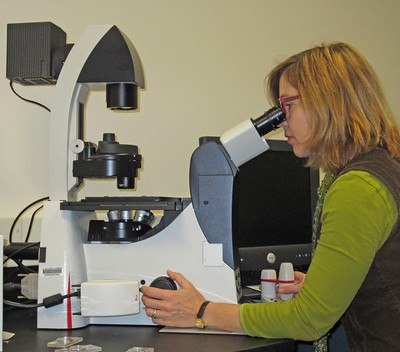2022 State Legislative Efforts Bring New Hope For Those Struggling With Infertility
By Ellen Trachman,
Above The Law
| 01. 26. 2022
"GLERL Scientist uses Lab's Inverted Microscope" by
NOAA Great Lakes Environmental Research Laboratory
is licensed under CC BY-NC-ND 2.0
One in eight Americans struggle with infertility. So the chance that you know someone (or are that person) in this situation is approximately 100%. But the price tag for fertility treatment — often $10,000 to $20,000 per attempt at conception through in vitro fertilization (IVF) — keeps the possibility of a child just out of reach for many.
Historically, insurance plans have excluded coverage for infertility, treating it differently than other medical conditions. However, that is slowly changing. Nineteen states (so far) have addressed the issue, and passed an infertility insurance law. This upcoming legislative session, a number of states are looking to continue the trend and increase access to fertility care.
I spoke with Betsy Campbell, chief engagement officer for RESOLVE: The National Infertility Association, about some of the state legislation that they were focused on this year. RESOLVE has worked tirelessly to advocate for better access to fertility care across the country and were instrumental in...
Related Articles
By Jessica Hamzelou, MIT Technology Review | 01.13.2025
Lisa Holligan already had two children when she decided to try for another baby. Her first two pregnancies had come easily. But for some unknown reason, the third didn’t. Holligan and her husband experienced miscarriage after miscarriage after miscarriage.
Like...
By Melissa Dahl, Slate | 01.13.2025
Mia used to say she’d never do in vitro fertilization. It’s a detail that feels significant now, looking back on the three long years that she and her husband, Chris, have spent trying to conceive. “When we first started trying...
By Tatiana Giovannucci, PET | 01.13.2025
Ten pregnant women and three others with their babies were repatriated to the Philippines after being pardoned by the Royal Government of Cambodia.
The women were recruited to act as surrogates in Cambodia, and were all pregnant at the time...
By Kristen V. Brown, The Atlantic | 01.15.2025
The first time Jamie Cassidy was pregnant, the fetus had a genetic mutation so devastating that she and her husband, Brennan, decided to terminate in the second trimester. The next time they tried for a baby, they weren’t taking chances...




